Cloud or Local PMS for Boutique Hotels: Justification & Ethics
VerifiedAdded on 2023/06/10
|9
|2285
|468
Essay
AI Summary
This essay examines the decision between adopting a cloud-based or local server-based Property Management System (PMS) for a small boutique hotel, justifying the choice with academic literature and considering ethical and sustainability aspects. It highlights the cost savings, scalability, and flexibility of cloud-based systems compared to the hardware and IT expenses associated with local servers. The discussion covers the advantages of cloud PMS, such as ease of setup, automatic updates, and mobile accessibility, while also addressing the importance of ethical and sustainable practices in hotel management, including cost savings, brand image, and guest experience. Ultimately, the essay recommends cloud-based PMS for the hospitality industry due to their multi-functionality, scalability, and ability to gather and analyze guest information, leading to improved management efficiency and customer experience.
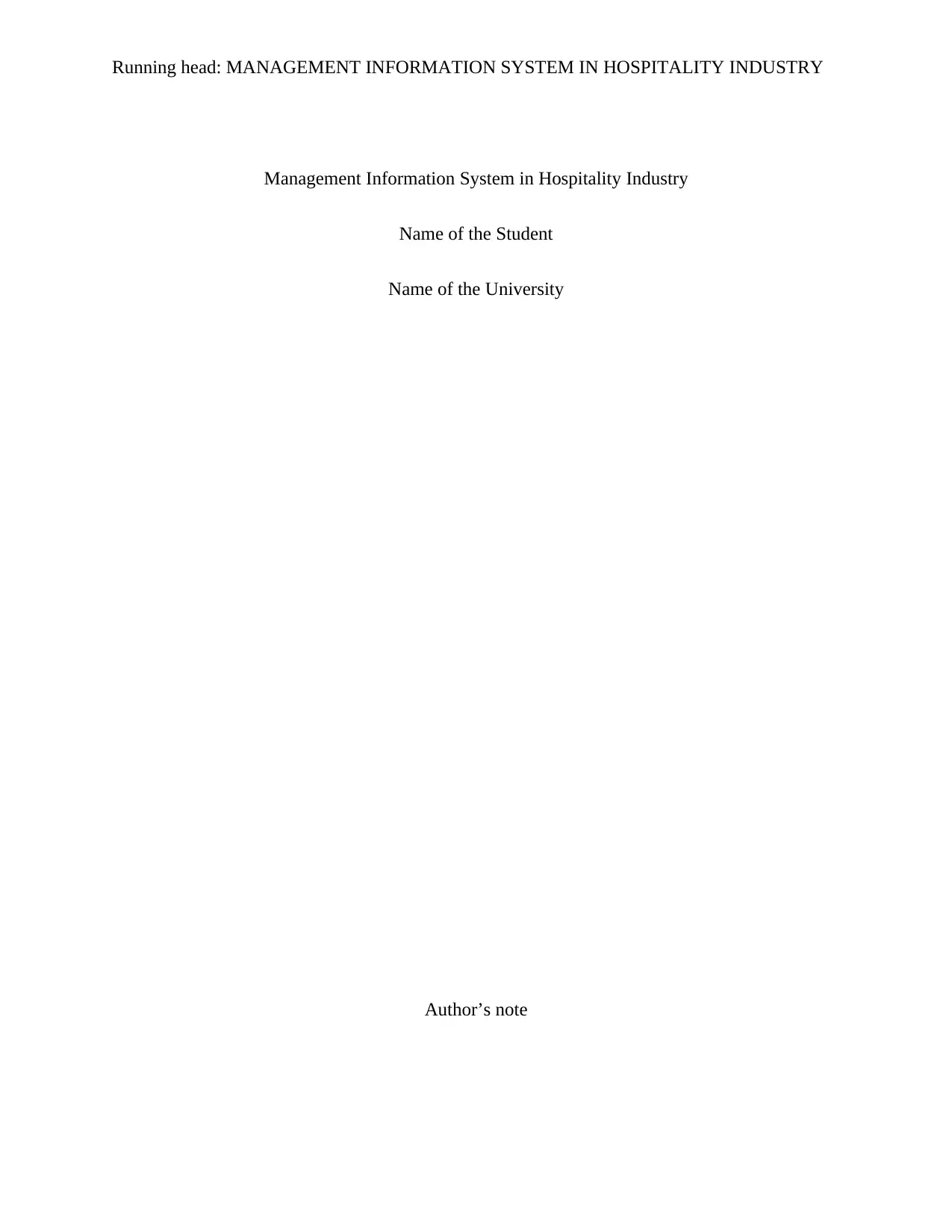
Running head: MANAGEMENT INFORMATION SYSTEM IN HOSPITALITY INDUSTRY
Management Information System in Hospitality Industry
Name of the Student
Name of the University
Author’s note
Management Information System in Hospitality Industry
Name of the Student
Name of the University
Author’s note
Paraphrase This Document
Need a fresh take? Get an instant paraphrase of this document with our AI Paraphraser
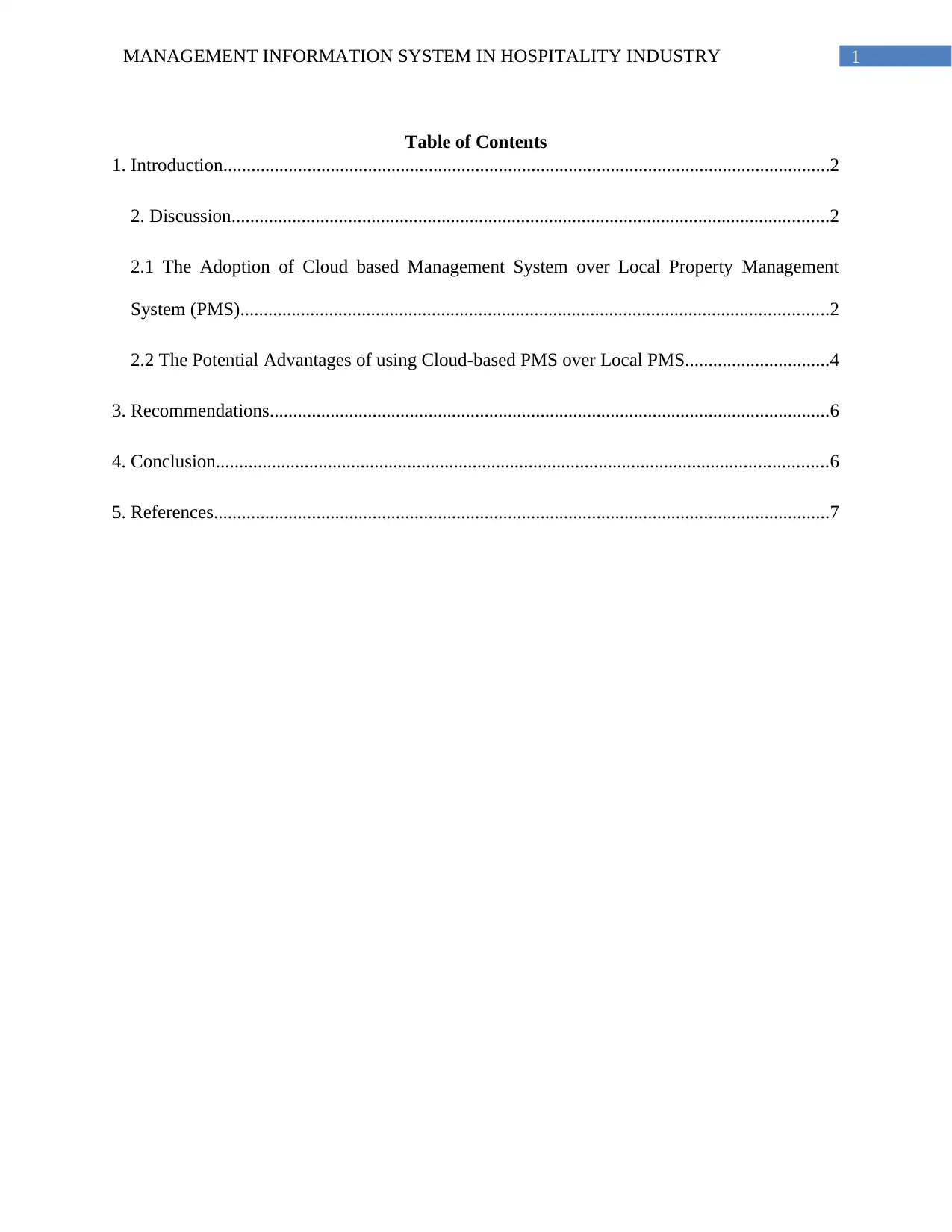
1MANAGEMENT INFORMATION SYSTEM IN HOSPITALITY INDUSTRY
Table of Contents
1. Introduction..................................................................................................................................2
2. Discussion................................................................................................................................2
2.1 The Adoption of Cloud based Management System over Local Property Management
System (PMS)..............................................................................................................................2
2.2 The Potential Advantages of using Cloud-based PMS over Local PMS...............................4
3. Recommendations........................................................................................................................6
4. Conclusion...................................................................................................................................6
5. References....................................................................................................................................7
Table of Contents
1. Introduction..................................................................................................................................2
2. Discussion................................................................................................................................2
2.1 The Adoption of Cloud based Management System over Local Property Management
System (PMS)..............................................................................................................................2
2.2 The Potential Advantages of using Cloud-based PMS over Local PMS...............................4
3. Recommendations........................................................................................................................6
4. Conclusion...................................................................................................................................6
5. References....................................................................................................................................7
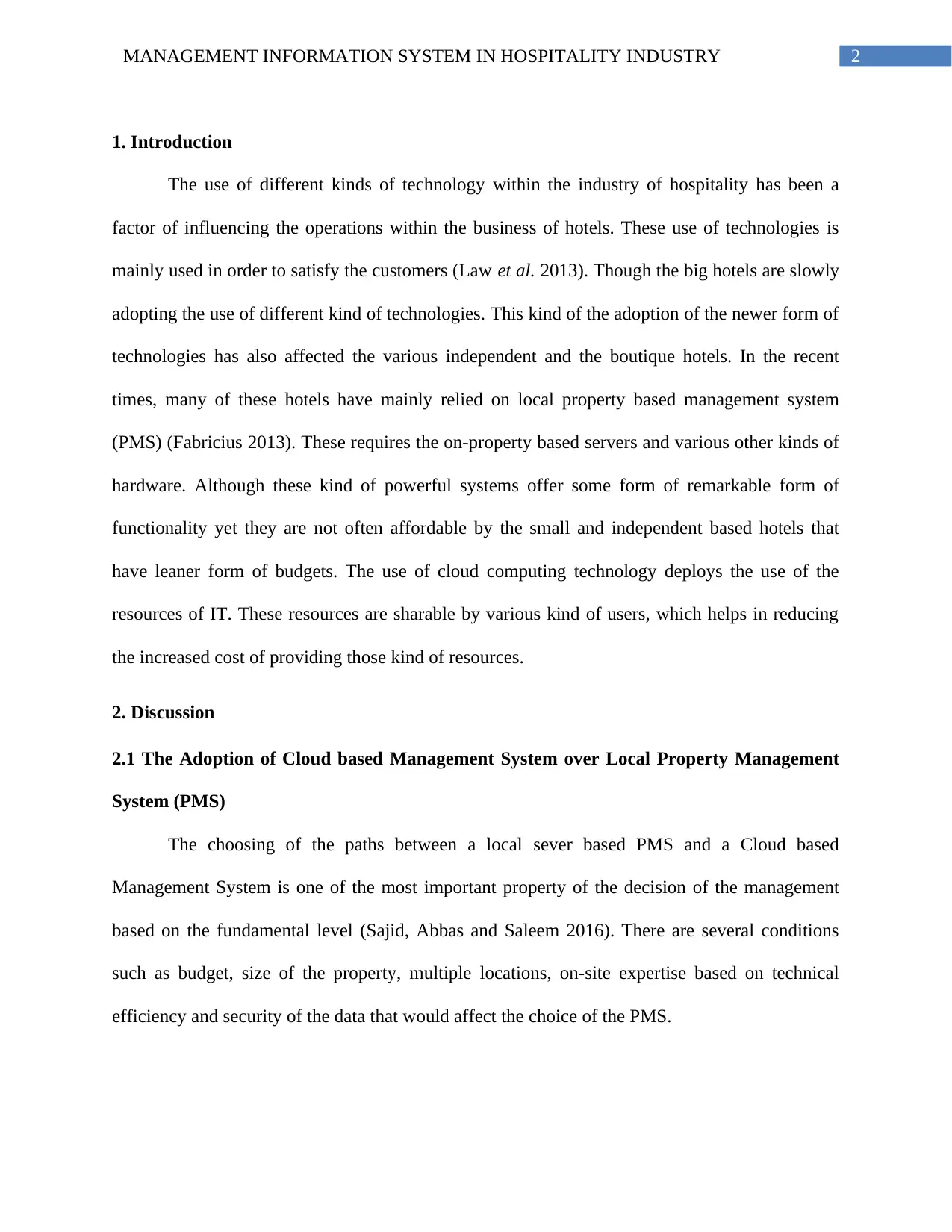
2MANAGEMENT INFORMATION SYSTEM IN HOSPITALITY INDUSTRY
1. Introduction
The use of different kinds of technology within the industry of hospitality has been a
factor of influencing the operations within the business of hotels. These use of technologies is
mainly used in order to satisfy the customers (Law et al. 2013). Though the big hotels are slowly
adopting the use of different kind of technologies. This kind of the adoption of the newer form of
technologies has also affected the various independent and the boutique hotels. In the recent
times, many of these hotels have mainly relied on local property based management system
(PMS) (Fabricius 2013). These requires the on-property based servers and various other kinds of
hardware. Although these kind of powerful systems offer some form of remarkable form of
functionality yet they are not often affordable by the small and independent based hotels that
have leaner form of budgets. The use of cloud computing technology deploys the use of the
resources of IT. These resources are sharable by various kind of users, which helps in reducing
the increased cost of providing those kind of resources.
2. Discussion
2.1 The Adoption of Cloud based Management System over Local Property Management
System (PMS)
The choosing of the paths between a local sever based PMS and a Cloud based
Management System is one of the most important property of the decision of the management
based on the fundamental level (Sajid, Abbas and Saleem 2016). There are several conditions
such as budget, size of the property, multiple locations, on-site expertise based on technical
efficiency and security of the data that would affect the choice of the PMS.
1. Introduction
The use of different kinds of technology within the industry of hospitality has been a
factor of influencing the operations within the business of hotels. These use of technologies is
mainly used in order to satisfy the customers (Law et al. 2013). Though the big hotels are slowly
adopting the use of different kind of technologies. This kind of the adoption of the newer form of
technologies has also affected the various independent and the boutique hotels. In the recent
times, many of these hotels have mainly relied on local property based management system
(PMS) (Fabricius 2013). These requires the on-property based servers and various other kinds of
hardware. Although these kind of powerful systems offer some form of remarkable form of
functionality yet they are not often affordable by the small and independent based hotels that
have leaner form of budgets. The use of cloud computing technology deploys the use of the
resources of IT. These resources are sharable by various kind of users, which helps in reducing
the increased cost of providing those kind of resources.
2. Discussion
2.1 The Adoption of Cloud based Management System over Local Property Management
System (PMS)
The choosing of the paths between a local sever based PMS and a Cloud based
Management System is one of the most important property of the decision of the management
based on the fundamental level (Sajid, Abbas and Saleem 2016). There are several conditions
such as budget, size of the property, multiple locations, on-site expertise based on technical
efficiency and security of the data that would affect the choice of the PMS.
⊘ This is a preview!⊘
Do you want full access?
Subscribe today to unlock all pages.

Trusted by 1+ million students worldwide
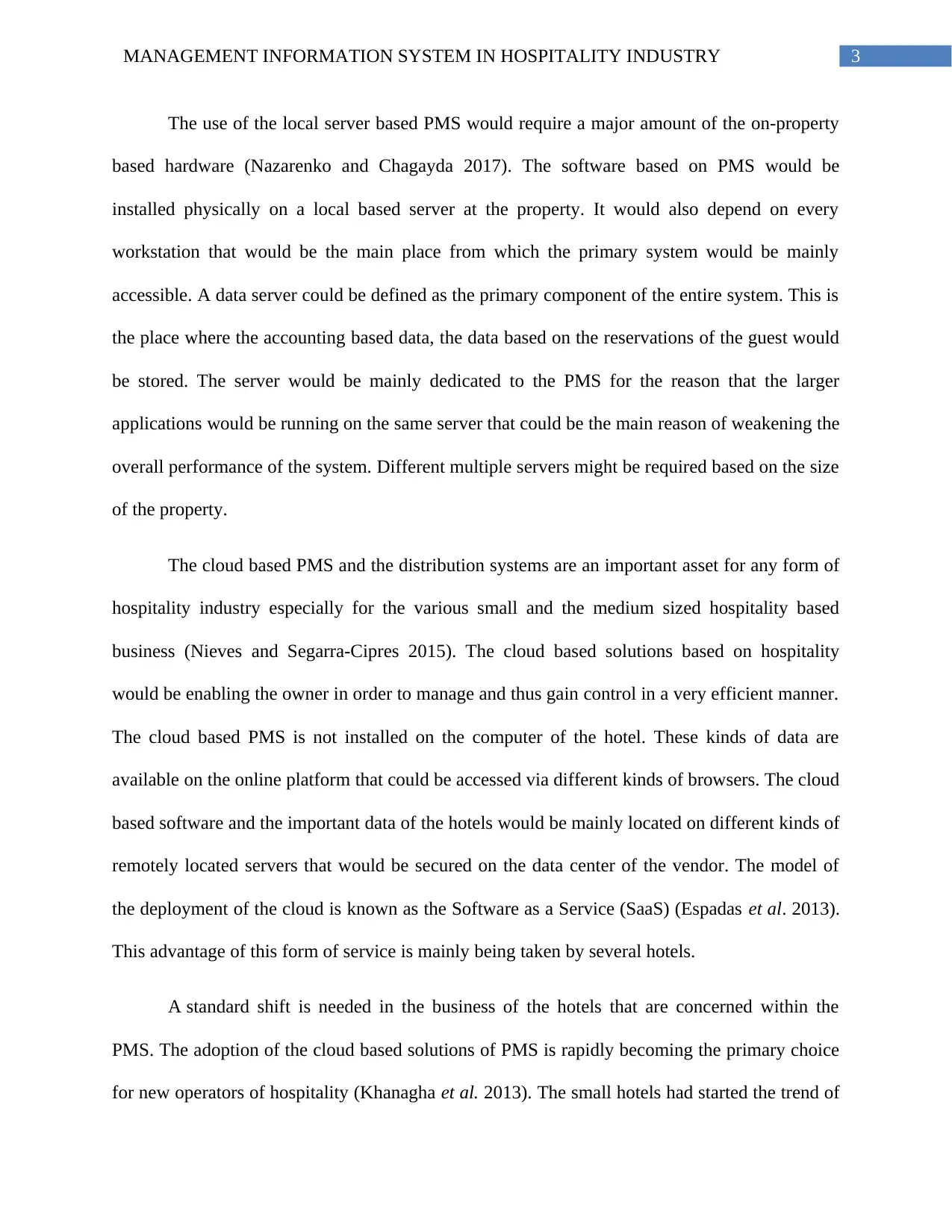
3MANAGEMENT INFORMATION SYSTEM IN HOSPITALITY INDUSTRY
The use of the local server based PMS would require a major amount of the on-property
based hardware (Nazarenko and Chagayda 2017). The software based on PMS would be
installed physically on a local based server at the property. It would also depend on every
workstation that would be the main place from which the primary system would be mainly
accessible. A data server could be defined as the primary component of the entire system. This is
the place where the accounting based data, the data based on the reservations of the guest would
be stored. The server would be mainly dedicated to the PMS for the reason that the larger
applications would be running on the same server that could be the main reason of weakening the
overall performance of the system. Different multiple servers might be required based on the size
of the property.
The cloud based PMS and the distribution systems are an important asset for any form of
hospitality industry especially for the various small and the medium sized hospitality based
business (Nieves and Segarra-Cipres 2015). The cloud based solutions based on hospitality
would be enabling the owner in order to manage and thus gain control in a very efficient manner.
The cloud based PMS is not installed on the computer of the hotel. These kinds of data are
available on the online platform that could be accessed via different kinds of browsers. The cloud
based software and the important data of the hotels would be mainly located on different kinds of
remotely located servers that would be secured on the data center of the vendor. The model of
the deployment of the cloud is known as the Software as a Service (SaaS) (Espadas et al. 2013).
This advantage of this form of service is mainly being taken by several hotels.
A standard shift is needed in the business of the hotels that are concerned within the
PMS. The adoption of the cloud based solutions of PMS is rapidly becoming the primary choice
for new operators of hospitality (Khanagha et al. 2013). The small hotels had started the trend of
The use of the local server based PMS would require a major amount of the on-property
based hardware (Nazarenko and Chagayda 2017). The software based on PMS would be
installed physically on a local based server at the property. It would also depend on every
workstation that would be the main place from which the primary system would be mainly
accessible. A data server could be defined as the primary component of the entire system. This is
the place where the accounting based data, the data based on the reservations of the guest would
be stored. The server would be mainly dedicated to the PMS for the reason that the larger
applications would be running on the same server that could be the main reason of weakening the
overall performance of the system. Different multiple servers might be required based on the size
of the property.
The cloud based PMS and the distribution systems are an important asset for any form of
hospitality industry especially for the various small and the medium sized hospitality based
business (Nieves and Segarra-Cipres 2015). The cloud based solutions based on hospitality
would be enabling the owner in order to manage and thus gain control in a very efficient manner.
The cloud based PMS is not installed on the computer of the hotel. These kinds of data are
available on the online platform that could be accessed via different kinds of browsers. The cloud
based software and the important data of the hotels would be mainly located on different kinds of
remotely located servers that would be secured on the data center of the vendor. The model of
the deployment of the cloud is known as the Software as a Service (SaaS) (Espadas et al. 2013).
This advantage of this form of service is mainly being taken by several hotels.
A standard shift is needed in the business of the hotels that are concerned within the
PMS. The adoption of the cloud based solutions of PMS is rapidly becoming the primary choice
for new operators of hospitality (Khanagha et al. 2013). The small hotels had started the trend of
Paraphrase This Document
Need a fresh take? Get an instant paraphrase of this document with our AI Paraphraser
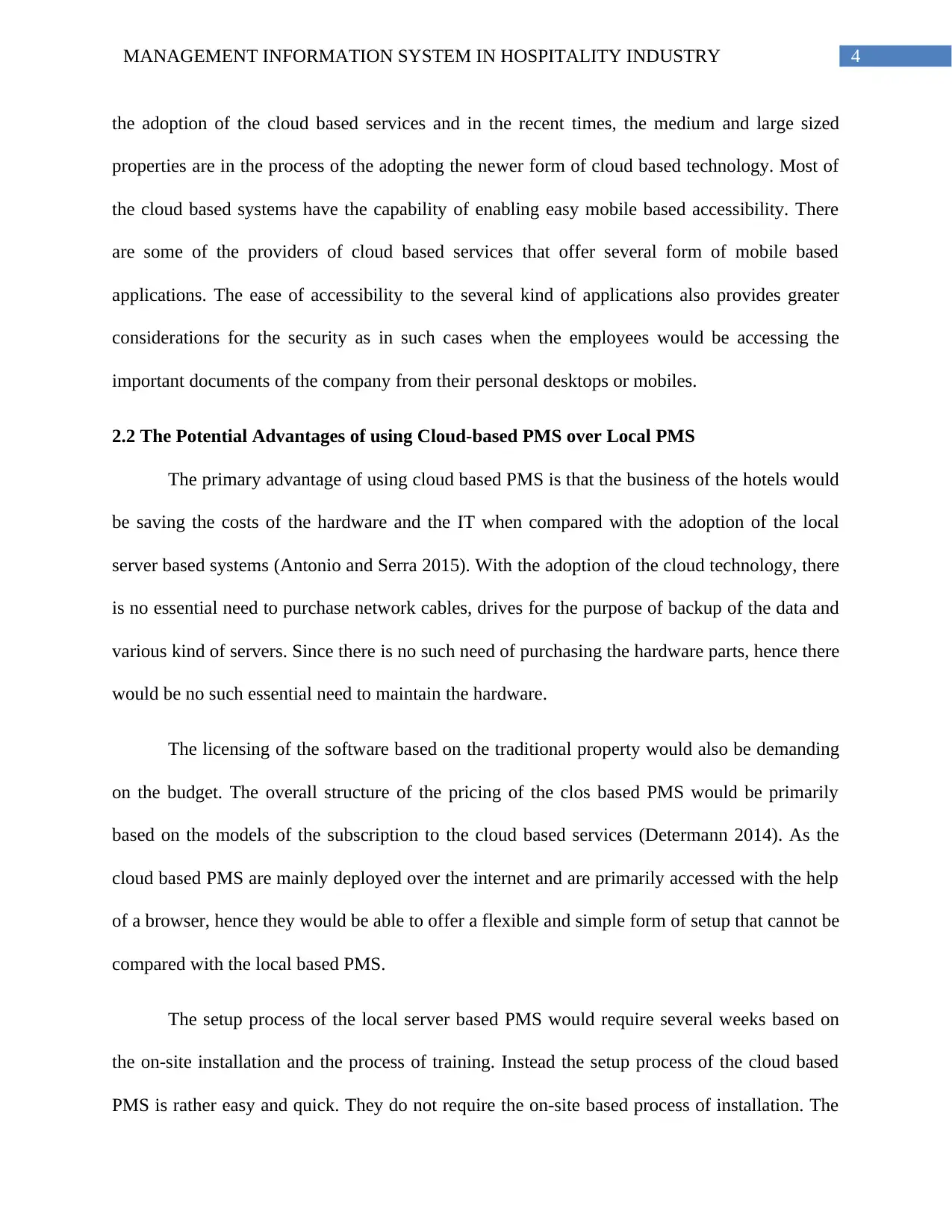
4MANAGEMENT INFORMATION SYSTEM IN HOSPITALITY INDUSTRY
the adoption of the cloud based services and in the recent times, the medium and large sized
properties are in the process of the adopting the newer form of cloud based technology. Most of
the cloud based systems have the capability of enabling easy mobile based accessibility. There
are some of the providers of cloud based services that offer several form of mobile based
applications. The ease of accessibility to the several kind of applications also provides greater
considerations for the security as in such cases when the employees would be accessing the
important documents of the company from their personal desktops or mobiles.
2.2 The Potential Advantages of using Cloud-based PMS over Local PMS
The primary advantage of using cloud based PMS is that the business of the hotels would
be saving the costs of the hardware and the IT when compared with the adoption of the local
server based systems (Antonio and Serra 2015). With the adoption of the cloud technology, there
is no essential need to purchase network cables, drives for the purpose of backup of the data and
various kind of servers. Since there is no such need of purchasing the hardware parts, hence there
would be no such essential need to maintain the hardware.
The licensing of the software based on the traditional property would also be demanding
on the budget. The overall structure of the pricing of the clos based PMS would be primarily
based on the models of the subscription to the cloud based services (Determann 2014). As the
cloud based PMS are mainly deployed over the internet and are primarily accessed with the help
of a browser, hence they would be able to offer a flexible and simple form of setup that cannot be
compared with the local based PMS.
The setup process of the local server based PMS would require several weeks based on
the on-site installation and the process of training. Instead the setup process of the cloud based
PMS is rather easy and quick. They do not require the on-site based process of installation. The
the adoption of the cloud based services and in the recent times, the medium and large sized
properties are in the process of the adopting the newer form of cloud based technology. Most of
the cloud based systems have the capability of enabling easy mobile based accessibility. There
are some of the providers of cloud based services that offer several form of mobile based
applications. The ease of accessibility to the several kind of applications also provides greater
considerations for the security as in such cases when the employees would be accessing the
important documents of the company from their personal desktops or mobiles.
2.2 The Potential Advantages of using Cloud-based PMS over Local PMS
The primary advantage of using cloud based PMS is that the business of the hotels would
be saving the costs of the hardware and the IT when compared with the adoption of the local
server based systems (Antonio and Serra 2015). With the adoption of the cloud technology, there
is no essential need to purchase network cables, drives for the purpose of backup of the data and
various kind of servers. Since there is no such need of purchasing the hardware parts, hence there
would be no such essential need to maintain the hardware.
The licensing of the software based on the traditional property would also be demanding
on the budget. The overall structure of the pricing of the clos based PMS would be primarily
based on the models of the subscription to the cloud based services (Determann 2014). As the
cloud based PMS are mainly deployed over the internet and are primarily accessed with the help
of a browser, hence they would be able to offer a flexible and simple form of setup that cannot be
compared with the local based PMS.
The setup process of the local server based PMS would require several weeks based on
the on-site installation and the process of training. Instead the setup process of the cloud based
PMS is rather easy and quick. They do not require the on-site based process of installation. The
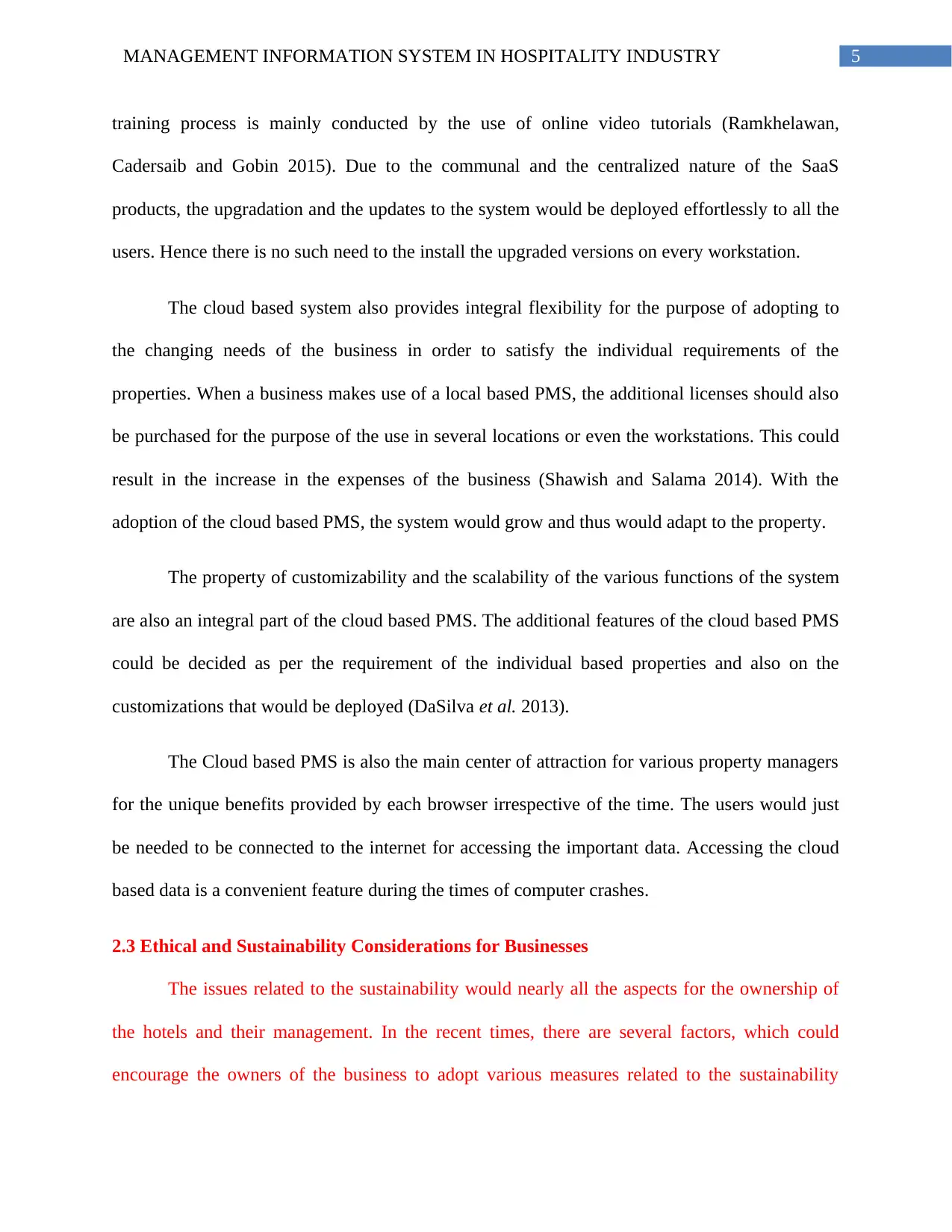
5MANAGEMENT INFORMATION SYSTEM IN HOSPITALITY INDUSTRY
training process is mainly conducted by the use of online video tutorials (Ramkhelawan,
Cadersaib and Gobin 2015). Due to the communal and the centralized nature of the SaaS
products, the upgradation and the updates to the system would be deployed effortlessly to all the
users. Hence there is no such need to the install the upgraded versions on every workstation.
The cloud based system also provides integral flexibility for the purpose of adopting to
the changing needs of the business in order to satisfy the individual requirements of the
properties. When a business makes use of a local based PMS, the additional licenses should also
be purchased for the purpose of the use in several locations or even the workstations. This could
result in the increase in the expenses of the business (Shawish and Salama 2014). With the
adoption of the cloud based PMS, the system would grow and thus would adapt to the property.
The property of customizability and the scalability of the various functions of the system
are also an integral part of the cloud based PMS. The additional features of the cloud based PMS
could be decided as per the requirement of the individual based properties and also on the
customizations that would be deployed (DaSilva et al. 2013).
The Cloud based PMS is also the main center of attraction for various property managers
for the unique benefits provided by each browser irrespective of the time. The users would just
be needed to be connected to the internet for accessing the important data. Accessing the cloud
based data is a convenient feature during the times of computer crashes.
2.3 Ethical and Sustainability Considerations for Businesses
The issues related to the sustainability would nearly all the aspects for the ownership of
the hotels and their management. In the recent times, there are several factors, which could
encourage the owners of the business to adopt various measures related to the sustainability
training process is mainly conducted by the use of online video tutorials (Ramkhelawan,
Cadersaib and Gobin 2015). Due to the communal and the centralized nature of the SaaS
products, the upgradation and the updates to the system would be deployed effortlessly to all the
users. Hence there is no such need to the install the upgraded versions on every workstation.
The cloud based system also provides integral flexibility for the purpose of adopting to
the changing needs of the business in order to satisfy the individual requirements of the
properties. When a business makes use of a local based PMS, the additional licenses should also
be purchased for the purpose of the use in several locations or even the workstations. This could
result in the increase in the expenses of the business (Shawish and Salama 2014). With the
adoption of the cloud based PMS, the system would grow and thus would adapt to the property.
The property of customizability and the scalability of the various functions of the system
are also an integral part of the cloud based PMS. The additional features of the cloud based PMS
could be decided as per the requirement of the individual based properties and also on the
customizations that would be deployed (DaSilva et al. 2013).
The Cloud based PMS is also the main center of attraction for various property managers
for the unique benefits provided by each browser irrespective of the time. The users would just
be needed to be connected to the internet for accessing the important data. Accessing the cloud
based data is a convenient feature during the times of computer crashes.
2.3 Ethical and Sustainability Considerations for Businesses
The issues related to the sustainability would nearly all the aspects for the ownership of
the hotels and their management. In the recent times, there are several factors, which could
encourage the owners of the business to adopt various measures related to the sustainability
⊘ This is a preview!⊘
Do you want full access?
Subscribe today to unlock all pages.

Trusted by 1+ million students worldwide
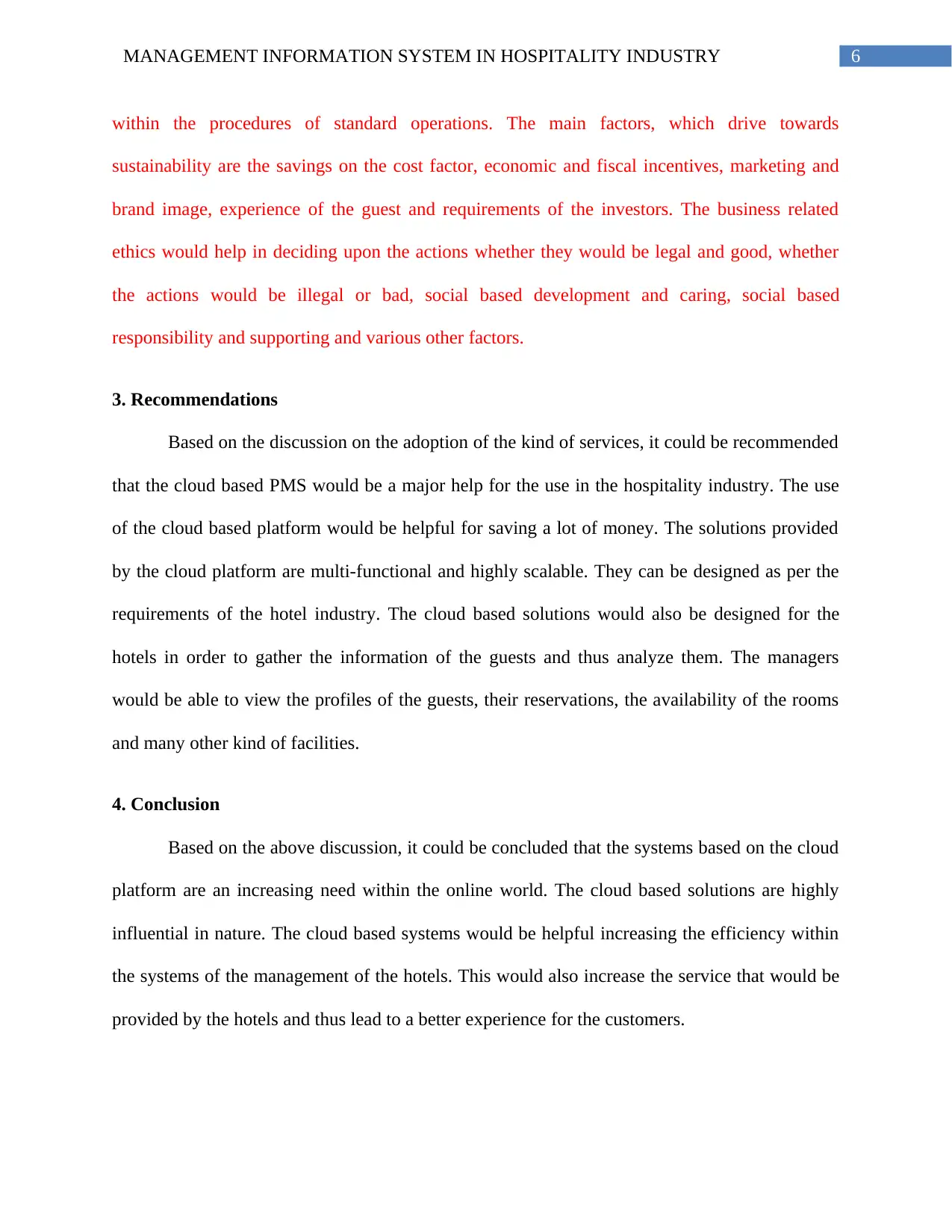
6MANAGEMENT INFORMATION SYSTEM IN HOSPITALITY INDUSTRY
within the procedures of standard operations. The main factors, which drive towards
sustainability are the savings on the cost factor, economic and fiscal incentives, marketing and
brand image, experience of the guest and requirements of the investors. The business related
ethics would help in deciding upon the actions whether they would be legal and good, whether
the actions would be illegal or bad, social based development and caring, social based
responsibility and supporting and various other factors.
3. Recommendations
Based on the discussion on the adoption of the kind of services, it could be recommended
that the cloud based PMS would be a major help for the use in the hospitality industry. The use
of the cloud based platform would be helpful for saving a lot of money. The solutions provided
by the cloud platform are multi-functional and highly scalable. They can be designed as per the
requirements of the hotel industry. The cloud based solutions would also be designed for the
hotels in order to gather the information of the guests and thus analyze them. The managers
would be able to view the profiles of the guests, their reservations, the availability of the rooms
and many other kind of facilities.
4. Conclusion
Based on the above discussion, it could be concluded that the systems based on the cloud
platform are an increasing need within the online world. The cloud based solutions are highly
influential in nature. The cloud based systems would be helpful increasing the efficiency within
the systems of the management of the hotels. This would also increase the service that would be
provided by the hotels and thus lead to a better experience for the customers.
within the procedures of standard operations. The main factors, which drive towards
sustainability are the savings on the cost factor, economic and fiscal incentives, marketing and
brand image, experience of the guest and requirements of the investors. The business related
ethics would help in deciding upon the actions whether they would be legal and good, whether
the actions would be illegal or bad, social based development and caring, social based
responsibility and supporting and various other factors.
3. Recommendations
Based on the discussion on the adoption of the kind of services, it could be recommended
that the cloud based PMS would be a major help for the use in the hospitality industry. The use
of the cloud based platform would be helpful for saving a lot of money. The solutions provided
by the cloud platform are multi-functional and highly scalable. They can be designed as per the
requirements of the hotel industry. The cloud based solutions would also be designed for the
hotels in order to gather the information of the guests and thus analyze them. The managers
would be able to view the profiles of the guests, their reservations, the availability of the rooms
and many other kind of facilities.
4. Conclusion
Based on the above discussion, it could be concluded that the systems based on the cloud
platform are an increasing need within the online world. The cloud based solutions are highly
influential in nature. The cloud based systems would be helpful increasing the efficiency within
the systems of the management of the hotels. This would also increase the service that would be
provided by the hotels and thus lead to a better experience for the customers.
Paraphrase This Document
Need a fresh take? Get an instant paraphrase of this document with our AI Paraphraser
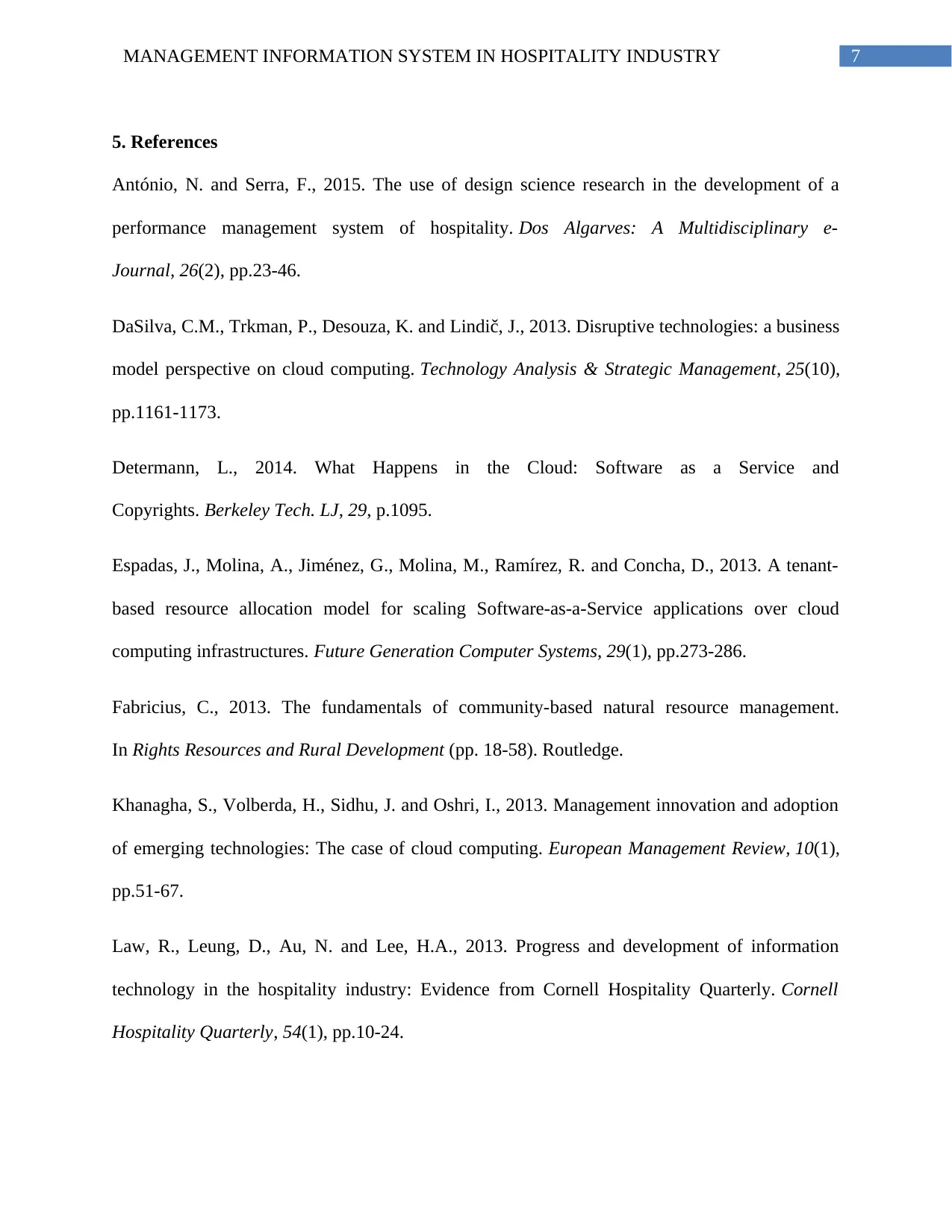
7MANAGEMENT INFORMATION SYSTEM IN HOSPITALITY INDUSTRY
5. References
António, N. and Serra, F., 2015. The use of design science research in the development of a
performance management system of hospitality. Dos Algarves: A Multidisciplinary e-
Journal, 26(2), pp.23-46.
DaSilva, C.M., Trkman, P., Desouza, K. and Lindič, J., 2013. Disruptive technologies: a business
model perspective on cloud computing. Technology Analysis & Strategic Management, 25(10),
pp.1161-1173.
Determann, L., 2014. What Happens in the Cloud: Software as a Service and
Copyrights. Berkeley Tech. LJ, 29, p.1095.
Espadas, J., Molina, A., Jiménez, G., Molina, M., Ramírez, R. and Concha, D., 2013. A tenant-
based resource allocation model for scaling Software-as-a-Service applications over cloud
computing infrastructures. Future Generation Computer Systems, 29(1), pp.273-286.
Fabricius, C., 2013. The fundamentals of community-based natural resource management.
In Rights Resources and Rural Development (pp. 18-58). Routledge.
Khanagha, S., Volberda, H., Sidhu, J. and Oshri, I., 2013. Management innovation and adoption
of emerging technologies: The case of cloud computing. European Management Review, 10(1),
pp.51-67.
Law, R., Leung, D., Au, N. and Lee, H.A., 2013. Progress and development of information
technology in the hospitality industry: Evidence from Cornell Hospitality Quarterly. Cornell
Hospitality Quarterly, 54(1), pp.10-24.
5. References
António, N. and Serra, F., 2015. The use of design science research in the development of a
performance management system of hospitality. Dos Algarves: A Multidisciplinary e-
Journal, 26(2), pp.23-46.
DaSilva, C.M., Trkman, P., Desouza, K. and Lindič, J., 2013. Disruptive technologies: a business
model perspective on cloud computing. Technology Analysis & Strategic Management, 25(10),
pp.1161-1173.
Determann, L., 2014. What Happens in the Cloud: Software as a Service and
Copyrights. Berkeley Tech. LJ, 29, p.1095.
Espadas, J., Molina, A., Jiménez, G., Molina, M., Ramírez, R. and Concha, D., 2013. A tenant-
based resource allocation model for scaling Software-as-a-Service applications over cloud
computing infrastructures. Future Generation Computer Systems, 29(1), pp.273-286.
Fabricius, C., 2013. The fundamentals of community-based natural resource management.
In Rights Resources and Rural Development (pp. 18-58). Routledge.
Khanagha, S., Volberda, H., Sidhu, J. and Oshri, I., 2013. Management innovation and adoption
of emerging technologies: The case of cloud computing. European Management Review, 10(1),
pp.51-67.
Law, R., Leung, D., Au, N. and Lee, H.A., 2013. Progress and development of information
technology in the hospitality industry: Evidence from Cornell Hospitality Quarterly. Cornell
Hospitality Quarterly, 54(1), pp.10-24.
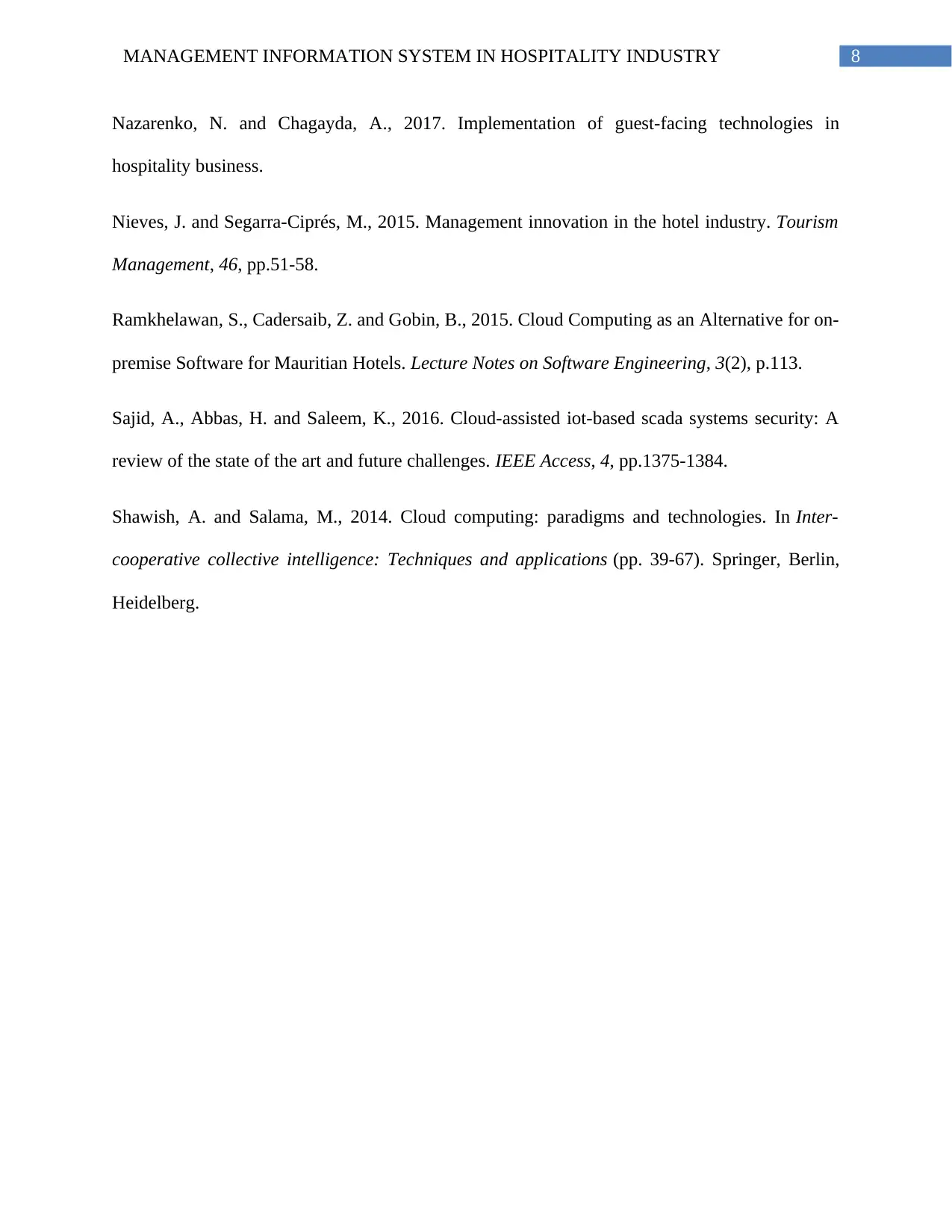
8MANAGEMENT INFORMATION SYSTEM IN HOSPITALITY INDUSTRY
Nazarenko, N. and Chagayda, A., 2017. Implementation of guest-facing technologies in
hospitality business.
Nieves, J. and Segarra-Ciprés, M., 2015. Management innovation in the hotel industry. Tourism
Management, 46, pp.51-58.
Ramkhelawan, S., Cadersaib, Z. and Gobin, B., 2015. Cloud Computing as an Alternative for on-
premise Software for Mauritian Hotels. Lecture Notes on Software Engineering, 3(2), p.113.
Sajid, A., Abbas, H. and Saleem, K., 2016. Cloud-assisted iot-based scada systems security: A
review of the state of the art and future challenges. IEEE Access, 4, pp.1375-1384.
Shawish, A. and Salama, M., 2014. Cloud computing: paradigms and technologies. In Inter-
cooperative collective intelligence: Techniques and applications (pp. 39-67). Springer, Berlin,
Heidelberg.
Nazarenko, N. and Chagayda, A., 2017. Implementation of guest-facing technologies in
hospitality business.
Nieves, J. and Segarra-Ciprés, M., 2015. Management innovation in the hotel industry. Tourism
Management, 46, pp.51-58.
Ramkhelawan, S., Cadersaib, Z. and Gobin, B., 2015. Cloud Computing as an Alternative for on-
premise Software for Mauritian Hotels. Lecture Notes on Software Engineering, 3(2), p.113.
Sajid, A., Abbas, H. and Saleem, K., 2016. Cloud-assisted iot-based scada systems security: A
review of the state of the art and future challenges. IEEE Access, 4, pp.1375-1384.
Shawish, A. and Salama, M., 2014. Cloud computing: paradigms and technologies. In Inter-
cooperative collective intelligence: Techniques and applications (pp. 39-67). Springer, Berlin,
Heidelberg.
⊘ This is a preview!⊘
Do you want full access?
Subscribe today to unlock all pages.

Trusted by 1+ million students worldwide
1 out of 9
Related Documents
Your All-in-One AI-Powered Toolkit for Academic Success.
+13062052269
info@desklib.com
Available 24*7 on WhatsApp / Email
![[object Object]](/_next/static/media/star-bottom.7253800d.svg)
Unlock your academic potential
Copyright © 2020–2025 A2Z Services. All Rights Reserved. Developed and managed by ZUCOL.





